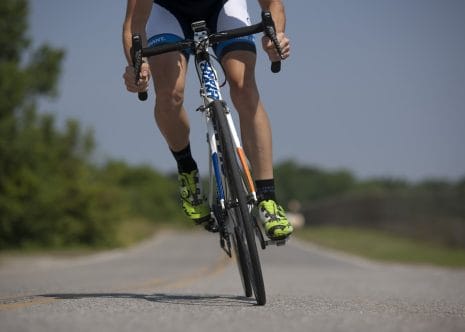
Aug 8, 2017 | Senza categoria
 Francesco was a rugged sportsman, especially on his bike. Every day he would ride several kilometres over the tortuous and picturesque paths of the Roman hills, to help keep in shape. He looks young, but it’s already been quite a few years since he decided to give his life to loving God in the neighbours he meets each day – but also in the hard times in his own life as well as in the lives of others. A few days ago, during one of his usual workouts, his bike hit a rock and the steering wheel broke, catapulting him into the air. The landing wasn’t gentle . . . and the first to hit the hard asphalt was his neck, resulting in damage to the C2 vertebrae. In a single second the whole panorama changed: from intense physical training to immobility on a hospital bed, inside an iron “cage” from the neck up, kept in place with screws pressing against the skull. . . That’s also why it was important to him to stay in shape. The apparatus is meant to impede movement and hopefully lead to the soldering of the injured vertebrae. He sends a phone message from his hospital bed: “C2 Vertebrae, you barged in on my day and changed everything. I didn’t even know you were there and, if you were, where? Then came that abrupt landing on the asphalt and amidst all the broken parts you were the one everybody was worried about. You had the power to cause my death, or to render me immobile in a wheelchair. It was enough for you to allow the axis vertebrae to break … that piece of bone which makes it possible for me to move my head. Let’s hope that after this blow, I won’t have to change my vision of the world and that with the help of this futuristic device you will be able to go back to being the fulcrum of all that moves. Big C2, I’m trying to rebuild my relationship with you, not only out of self interest, but to know the amazing things of which we are made. Every little piece matters! May these moments help me to discover how valuable everything is in me, all of it the fruit of Your love.” Francesco (Italy)
Francesco was a rugged sportsman, especially on his bike. Every day he would ride several kilometres over the tortuous and picturesque paths of the Roman hills, to help keep in shape. He looks young, but it’s already been quite a few years since he decided to give his life to loving God in the neighbours he meets each day – but also in the hard times in his own life as well as in the lives of others. A few days ago, during one of his usual workouts, his bike hit a rock and the steering wheel broke, catapulting him into the air. The landing wasn’t gentle . . . and the first to hit the hard asphalt was his neck, resulting in damage to the C2 vertebrae. In a single second the whole panorama changed: from intense physical training to immobility on a hospital bed, inside an iron “cage” from the neck up, kept in place with screws pressing against the skull. . . That’s also why it was important to him to stay in shape. The apparatus is meant to impede movement and hopefully lead to the soldering of the injured vertebrae. He sends a phone message from his hospital bed: “C2 Vertebrae, you barged in on my day and changed everything. I didn’t even know you were there and, if you were, where? Then came that abrupt landing on the asphalt and amidst all the broken parts you were the one everybody was worried about. You had the power to cause my death, or to render me immobile in a wheelchair. It was enough for you to allow the axis vertebrae to break … that piece of bone which makes it possible for me to move my head. Let’s hope that after this blow, I won’t have to change my vision of the world and that with the help of this futuristic device you will be able to go back to being the fulcrum of all that moves. Big C2, I’m trying to rebuild my relationship with you, not only out of self interest, but to know the amazing things of which we are made. Every little piece matters! May these moments help me to discover how valuable everything is in me, all of it the fruit of Your love.” Francesco (Italy)
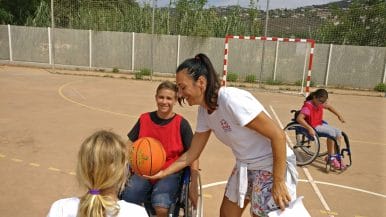
Aug 7, 2017 | Focolare Worldwide, Senza categoria
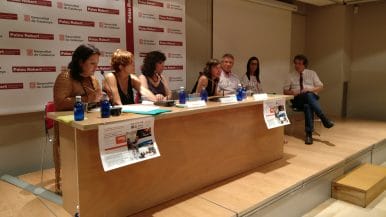 On July 13, 2017, seventy people from various places in Spain, Italy and Croatia attended the “Inclusive Schools, Social Innovation, Childhood and Sport Symposium” which was held at the Palau Robert Gardens of Barcelona. The event was organized by the Laboratorio de Investigación Prosocial Aplicada (LIPA), Universitat Autònoma de Barcelona and by the Sportmeet International Network. Teachers, physiotherapists and sport players took a closer look at projects that promote inclusion, intervention models and disability from the standpoint of inclusion, in the belief that no part of life is not worth living. Life needs to have a place for weakness, to experience, through weakness, one’s own ability to recuperate. In the days that followed, the Mariapolis Centre of Castell d’Aro provided the forum for the Summer School in which topics regarding inclusive sport were examined and discussed. Twenty people attended and were guided through the experience by experts Eugenio Jimènez and Dr Javier Lamoneda. Through games they learned what it’s like to be in the shoes of a person with a disability. By its very nature sport is an everyday opportunity to come face to face with limitations, and offers opportunities for reflection on the obstacles of life, suffering and disadvantage. The reflections that were presented by Paolo Crepaz from Sportmeet led the participants to question the concepts of limitation, barriers, obstacles, suffering and disadvantage from the standpoint of things that can be turned into potential, an opportunity to “constantly tend, by force of habit, towards universal brotherhood” (Chiara Lubich).
On July 13, 2017, seventy people from various places in Spain, Italy and Croatia attended the “Inclusive Schools, Social Innovation, Childhood and Sport Symposium” which was held at the Palau Robert Gardens of Barcelona. The event was organized by the Laboratorio de Investigación Prosocial Aplicada (LIPA), Universitat Autònoma de Barcelona and by the Sportmeet International Network. Teachers, physiotherapists and sport players took a closer look at projects that promote inclusion, intervention models and disability from the standpoint of inclusion, in the belief that no part of life is not worth living. Life needs to have a place for weakness, to experience, through weakness, one’s own ability to recuperate. In the days that followed, the Mariapolis Centre of Castell d’Aro provided the forum for the Summer School in which topics regarding inclusive sport were examined and discussed. Twenty people attended and were guided through the experience by experts Eugenio Jimènez and Dr Javier Lamoneda. Through games they learned what it’s like to be in the shoes of a person with a disability. By its very nature sport is an everyday opportunity to come face to face with limitations, and offers opportunities for reflection on the obstacles of life, suffering and disadvantage. The reflections that were presented by Paolo Crepaz from Sportmeet led the participants to question the concepts of limitation, barriers, obstacles, suffering and disadvantage from the standpoint of things that can be turned into potential, an opportunity to “constantly tend, by force of habit, towards universal brotherhood” (Chiara Lubich).  Sport’s ability to get us to face and overcome obstacles, to be inclusive, to struggle against all sorts of barriers and in every social context is quite striking. For example, what a small ball can do in uniting people on an isolated summer field or inside a refugee camp. Players come face to face with one another within an atmosphere of mutual trust and esteem. Javier Lamoneda Prieto, professor of Physical Education, in Jerez de la Frontera, Spain, shared his own experience: “It seems like a team has formed over these days, a team that would like physical activity to become a source of encounter between different actors and sport professionals. It is the first time such a training course has been developed by the public university.” Roberto Niccolis, a sport operative from Verona, Italy: “The limit that I often encounter is that of the distance that separates people from each other; the handicap, I mean. Reducing this distance through sharing, getting to know one another and experiences with one another other make us feel closer.” Roberto Macri, President of the Opera Santa Rita Foundation, Prato, Italy: “Above all, you’ve created an opportunity for reflecting on ourselves and the values that emerge from our work. Not only our professional or volunteer work, but more generally what can give deeper meaning to being men or women.”
Sport’s ability to get us to face and overcome obstacles, to be inclusive, to struggle against all sorts of barriers and in every social context is quite striking. For example, what a small ball can do in uniting people on an isolated summer field or inside a refugee camp. Players come face to face with one another within an atmosphere of mutual trust and esteem. Javier Lamoneda Prieto, professor of Physical Education, in Jerez de la Frontera, Spain, shared his own experience: “It seems like a team has formed over these days, a team that would like physical activity to become a source of encounter between different actors and sport professionals. It is the first time such a training course has been developed by the public university.” Roberto Niccolis, a sport operative from Verona, Italy: “The limit that I often encounter is that of the distance that separates people from each other; the handicap, I mean. Reducing this distance through sharing, getting to know one another and experiences with one another other make us feel closer.” Roberto Macri, President of the Opera Santa Rita Foundation, Prato, Italy: “Above all, you’ve created an opportunity for reflecting on ourselves and the values that emerge from our work. Not only our professional or volunteer work, but more generally what can give deeper meaning to being men or women.”
Jul 29, 2017 | Senza categoria
Jul 25, 2017 | Focolare Worldwide, Senza categoria
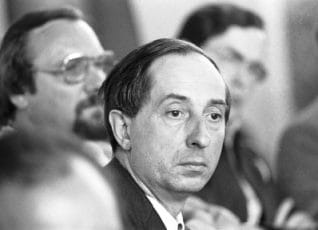
Jul 22, 2017 | Focolare Worldwide, Senza categoria
 Augustine provides us with one of the most valuable intuitions on prayer: “God’s ear hears the heart’s voice” (Comment on Psalm 148). Letting God’s ear rest on our heart, opening our heart to God’s ear: this is what it takes, this is the art of praying, an art, by the way, that’s for everyone. Actually, it’s not ours, but of the Spirit that God gives to us, the Spirit who prays in us, for we don’t know how or for what we should pray (cf Rm 8:26). […] Prayer is elevating the heart to God. But are we capable of that? Isn’t the range of our understanding too limited for our heart to be able to elevate itself to God? Isn’t the impulse of our heart too weak? Don’t burdens attach themselves to our heart and weigh on it, paralyze it and bring it down? What gives us the courage to claim: Our heart is turned to the Lord? His ear. He has lowered it to us. The Father listens to the Son. And the Son came down among us, into our flesh, into our heart. Within the heart of the Son, the Father listens to every beat of our heart, in the heart of the Son he finds our heart. In Him in whom we were made, loved, supported, gathered – the Father hears us. To elevate our heart means to leave it where it is and discover that where it is, with us, is the heart of God in the heart of his Son. Abandon yourself in Him and he will hold you. In Him, God’s ear is upon your heart; in Him your heart is at God’s ear. […] The opposite is just as true: God keeps his heart against your ear. He revealed, conveyed, gave, not something of Himself, but His Self. If you believe in him, if you adhere to Him, if you stick to Him, then you don’t hear a novelty, a directive, a command: you hear his heart. Stay near to Him until you discover this heart of yours. He’s in need of your patient listening in order to open your heart; actually, only patience comprehends love and learns love. He will reveal Himself to anyone who loves Him, and He makes His dwelling with that person (cf Jn 14:21-23). […] God has your heart at his ear, so that through your ear his heart penetrating your heart, might become your heart. The ear of God on your heart – the heart of God at your ear – like the alternating found in prayer. Only the pray-er knows God. Only the pray-er knows the human person. From Klaus Hemmerle, Con l’anima in ascolto, Guida alla preghiera,(Rome: Città Nuova Ed.,1989), 9-11.
Augustine provides us with one of the most valuable intuitions on prayer: “God’s ear hears the heart’s voice” (Comment on Psalm 148). Letting God’s ear rest on our heart, opening our heart to God’s ear: this is what it takes, this is the art of praying, an art, by the way, that’s for everyone. Actually, it’s not ours, but of the Spirit that God gives to us, the Spirit who prays in us, for we don’t know how or for what we should pray (cf Rm 8:26). […] Prayer is elevating the heart to God. But are we capable of that? Isn’t the range of our understanding too limited for our heart to be able to elevate itself to God? Isn’t the impulse of our heart too weak? Don’t burdens attach themselves to our heart and weigh on it, paralyze it and bring it down? What gives us the courage to claim: Our heart is turned to the Lord? His ear. He has lowered it to us. The Father listens to the Son. And the Son came down among us, into our flesh, into our heart. Within the heart of the Son, the Father listens to every beat of our heart, in the heart of the Son he finds our heart. In Him in whom we were made, loved, supported, gathered – the Father hears us. To elevate our heart means to leave it where it is and discover that where it is, with us, is the heart of God in the heart of his Son. Abandon yourself in Him and he will hold you. In Him, God’s ear is upon your heart; in Him your heart is at God’s ear. […] The opposite is just as true: God keeps his heart against your ear. He revealed, conveyed, gave, not something of Himself, but His Self. If you believe in him, if you adhere to Him, if you stick to Him, then you don’t hear a novelty, a directive, a command: you hear his heart. Stay near to Him until you discover this heart of yours. He’s in need of your patient listening in order to open your heart; actually, only patience comprehends love and learns love. He will reveal Himself to anyone who loves Him, and He makes His dwelling with that person (cf Jn 14:21-23). […] God has your heart at his ear, so that through your ear his heart penetrating your heart, might become your heart. The ear of God on your heart – the heart of God at your ear – like the alternating found in prayer. Only the pray-er knows God. Only the pray-er knows the human person. From Klaus Hemmerle, Con l’anima in ascolto, Guida alla preghiera,(Rome: Città Nuova Ed.,1989), 9-11.
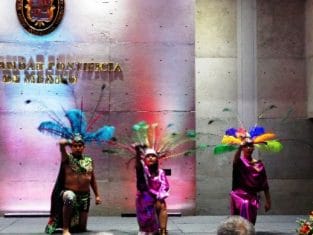
Jul 20, 2017 | Focolare Worldwide, Senza categoria
1944: Chiara Lubich left her beloved books in the attic to join the school of the one teacher, Jesus, leaving behind her dream to study philosophy at Catholic University, where she had thought she would be able to know God. Fifty-three years later, Catholic University of Mexico City conferred on her an honorary doctorate in philosophy.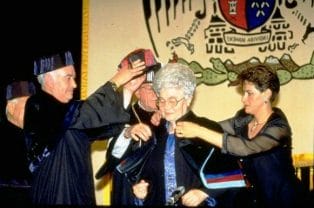 It’s been 20 years since the honorary doctorate, and the Focolare community in Mexico organized three events in memory of her message and to fulfill it: the philosophy of being, the Church as communion, and inculturation. June 29, 2017: “The face of God as communion” was the title of the symposium held at the Pontifical University of Mexico. Msgr Piero Coda, Dean of the Sophia University Institute, conducted two conferences: “Pope Francis: four points for an emerging Church” and “Chiara Lubich: a mysticism of ‘us’ to live through the change.” T
It’s been 20 years since the honorary doctorate, and the Focolare community in Mexico organized three events in memory of her message and to fulfill it: the philosophy of being, the Church as communion, and inculturation. June 29, 2017: “The face of God as communion” was the title of the symposium held at the Pontifical University of Mexico. Msgr Piero Coda, Dean of the Sophia University Institute, conducted two conferences: “Pope Francis: four points for an emerging Church” and “Chiara Lubich: a mysticism of ‘us’ to live through the change.” T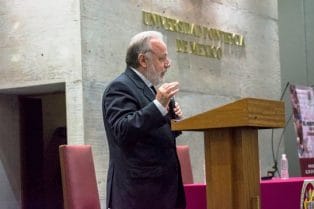 hese two reflections urged those present, mostly priests and men and women religious, towards pastoral work that shows a Church that is merciful, synodal, humble and open. “What surfaced,” affirmed Msgr Coda, “is the need to maintain an open dialogue with the vibrant strength that is in the Mexican church, to enthusiastically take up the challenge of pastoral change as advocated by Pope Francis. This encourages efforts by the laity at a cultural and societal level, working closely with young people, and the work of synods in the Church, where charisms can give their contribution.” June 30, 2017: Welcoming everyone to the hall at La Salle University in Mexico City, Dr Enrique Alejandro González Alvarez, dean of the university, explained the importance of the honoris causa doctorate conferred on Chiara Lubich in 1997. “Through her acceptance, it was she who honored the university,” he said, pointing to the profound harmony between the charism of unity and that of La Salle. “The University identifies with the Focolare Movement, because we work as allies to bring the kingdom of God here on earth, which without a doubt was Chiara’s primary mission,” Alvarez said. “May we continue to tighten the bonds that unite us. This is not only Chiara Lubich’s home, but of all who carry on in her spirit, so that today she can continue to live through her followers.” For the occasion Msgr Coda conducted a conference on “Chiara Lubich’s contribution to a new philosophy of being.” “Chiara’s speech 20 years ago,” Coda said, “showed itself to be prophetic for Mexico, as a new search for meaning and light, and the need for a new cultural paradigm at the social and cultural level. So her talk gave direction and can be connected to the commitment of Sophia University Institute.” New contacts and plans to collaborate were established between Sophia University Institute, the Pontifical University of Mexico and La Salle University.
hese two reflections urged those present, mostly priests and men and women religious, towards pastoral work that shows a Church that is merciful, synodal, humble and open. “What surfaced,” affirmed Msgr Coda, “is the need to maintain an open dialogue with the vibrant strength that is in the Mexican church, to enthusiastically take up the challenge of pastoral change as advocated by Pope Francis. This encourages efforts by the laity at a cultural and societal level, working closely with young people, and the work of synods in the Church, where charisms can give their contribution.” June 30, 2017: Welcoming everyone to the hall at La Salle University in Mexico City, Dr Enrique Alejandro González Alvarez, dean of the university, explained the importance of the honoris causa doctorate conferred on Chiara Lubich in 1997. “Through her acceptance, it was she who honored the university,” he said, pointing to the profound harmony between the charism of unity and that of La Salle. “The University identifies with the Focolare Movement, because we work as allies to bring the kingdom of God here on earth, which without a doubt was Chiara’s primary mission,” Alvarez said. “May we continue to tighten the bonds that unite us. This is not only Chiara Lubich’s home, but of all who carry on in her spirit, so that today she can continue to live through her followers.” For the occasion Msgr Coda conducted a conference on “Chiara Lubich’s contribution to a new philosophy of being.” “Chiara’s speech 20 years ago,” Coda said, “showed itself to be prophetic for Mexico, as a new search for meaning and light, and the need for a new cultural paradigm at the social and cultural level. So her talk gave direction and can be connected to the commitment of Sophia University Institute.” New contacts and plans to collaborate were established between Sophia University Institute, the Pontifical University of Mexico and La Salle University. The Focolare community threw a celebration in honor of June 7, 1997, together with the apostolic nuncio, Msgr Franco Coppola, and the Dean of the Pontifical University of Mexico, Dr Mario Ángel Flores Ramos. There was music, dance, video and testimonies from those present on that memorable day, which served as the perfect context to rediscover the depth of Chiara Lubich’s message. “In the basilica of the Madonna of Guadalupe,” said Maria Voce in her message to the Mexican community, “in front of the ‘Morenita,’ Chiara highlighted the wonderful symbols that Mary clothed herself in, presenting her as an extraordinary example of inculturation.” Chiara’s legacy, which obviously echoed the original message of Guadalupe, still strongly resonates, Focolare’s president said. “Let’s entrust ourselves to her, icon of the ‘culture of meeting,’ so that we might fully ‘make ourselves one’ and bring the spirituality of communion everywhere.”
The Focolare community threw a celebration in honor of June 7, 1997, together with the apostolic nuncio, Msgr Franco Coppola, and the Dean of the Pontifical University of Mexico, Dr Mario Ángel Flores Ramos. There was music, dance, video and testimonies from those present on that memorable day, which served as the perfect context to rediscover the depth of Chiara Lubich’s message. “In the basilica of the Madonna of Guadalupe,” said Maria Voce in her message to the Mexican community, “in front of the ‘Morenita,’ Chiara highlighted the wonderful symbols that Mary clothed herself in, presenting her as an extraordinary example of inculturation.” Chiara’s legacy, which obviously echoed the original message of Guadalupe, still strongly resonates, Focolare’s president said. “Let’s entrust ourselves to her, icon of the ‘culture of meeting,’ so that we might fully ‘make ourselves one’ and bring the spirituality of communion everywhere.”

 Francesco was a rugged sportsman, especially on his bike. Every day he would ride several kilometres over the tortuous and picturesque paths of the Roman hills, to help keep in shape. He looks young, but it’s already been quite a few years since he decided to give his life to loving God in the neighbours he meets each day – but also in the hard times in his own life as well as in the lives of others. A few days ago, during one of his usual workouts, his bike hit a rock and the steering wheel broke, catapulting him into the air. The landing wasn’t gentle . . . and the first to hit the hard asphalt was his neck, resulting in damage to the C2 vertebrae. In a single second the whole panorama changed: from intense physical training to immobility on a hospital bed, inside an iron “cage” from the neck up, kept in place with screws pressing against the skull. . . That’s also why it was important to him to stay in shape. The apparatus is meant to impede movement and hopefully lead to the soldering of the injured vertebrae. He sends a phone message from his hospital bed: “C2 Vertebrae, you barged in on my day and changed everything. I didn’t even know you were there and, if you were, where? Then came that abrupt landing on the asphalt and amidst all the broken parts you were the one everybody was worried about. You had the power to cause my death, or to render me immobile in a wheelchair. It was enough for you to allow the axis vertebrae to break … that piece of bone which makes it possible for me to move my head. Let’s hope that after this blow, I won’t have to change my vision of the world and that with the help of this futuristic device you will be able to go back to being the fulcrum of all that moves. Big C2, I’m trying to rebuild my relationship with you, not only out of self interest, but to know the amazing things of which we are made. Every little piece matters! May these moments help me to discover how valuable everything is in me, all of it the fruit of Your love.” Francesco (Italy)
Francesco was a rugged sportsman, especially on his bike. Every day he would ride several kilometres over the tortuous and picturesque paths of the Roman hills, to help keep in shape. He looks young, but it’s already been quite a few years since he decided to give his life to loving God in the neighbours he meets each day – but also in the hard times in his own life as well as in the lives of others. A few days ago, during one of his usual workouts, his bike hit a rock and the steering wheel broke, catapulting him into the air. The landing wasn’t gentle . . . and the first to hit the hard asphalt was his neck, resulting in damage to the C2 vertebrae. In a single second the whole panorama changed: from intense physical training to immobility on a hospital bed, inside an iron “cage” from the neck up, kept in place with screws pressing against the skull. . . That’s also why it was important to him to stay in shape. The apparatus is meant to impede movement and hopefully lead to the soldering of the injured vertebrae. He sends a phone message from his hospital bed: “C2 Vertebrae, you barged in on my day and changed everything. I didn’t even know you were there and, if you were, where? Then came that abrupt landing on the asphalt and amidst all the broken parts you were the one everybody was worried about. You had the power to cause my death, or to render me immobile in a wheelchair. It was enough for you to allow the axis vertebrae to break … that piece of bone which makes it possible for me to move my head. Let’s hope that after this blow, I won’t have to change my vision of the world and that with the help of this futuristic device you will be able to go back to being the fulcrum of all that moves. Big C2, I’m trying to rebuild my relationship with you, not only out of self interest, but to know the amazing things of which we are made. Every little piece matters! May these moments help me to discover how valuable everything is in me, all of it the fruit of Your love.” Francesco (Italy)




 It’s been 20 years since the honorary doctorate, and the Focolare community in Mexico organized three events in memory of her message and to fulfill it: the philosophy of being, the Church as communion, and inculturation. June 29, 2017: “The face of God as communion” was the title of the symposium held at the Pontifical University of Mexico. Msgr Piero Coda, Dean of the
It’s been 20 years since the honorary doctorate, and the Focolare community in Mexico organized three events in memory of her message and to fulfill it: the philosophy of being, the Church as communion, and inculturation. June 29, 2017: “The face of God as communion” was the title of the symposium held at the Pontifical University of Mexico. Msgr Piero Coda, Dean of the  hese two reflections urged those present, mostly priests and men and women religious, towards pastoral work that shows a Church that is merciful, synodal, humble and open. “What surfaced,” affirmed Msgr Coda, “is the need to maintain an open dialogue with the vibrant strength that is in the Mexican church, to enthusiastically take up the challenge of pastoral change as advocated by Pope Francis. This encourages efforts by the laity at a cultural and societal level, working closely with young people, and the work of synods in the Church, where charisms can give their contribution.” June 30, 2017: Welcoming everyone to the hall at La Salle University in Mexico City, Dr Enrique Alejandro González Alvarez, dean of the university, explained the importance of the honoris causa doctorate conferred on Chiara Lubich in 1997. “Through her acceptance, it was she who honored the university,” he said, pointing to the profound harmony between the charism of unity and that of La Salle. “The University identifies with the Focolare Movement, because we work as allies to bring the kingdom of God here on earth, which without a doubt was Chiara’s primary mission,” Alvarez said. “May we continue to tighten the bonds that unite us. This is not only Chiara Lubich’s home, but of all who carry on in her spirit, so that today she can continue to live through her followers.” For the occasion Msgr Coda conducted a conference on “Chiara Lubich’s contribution to a new philosophy of being.” “Chiara’s speech 20 years ago,” Coda said, “showed itself to be prophetic for Mexico, as a new search for meaning and light, and the need for a new cultural paradigm at the social and cultural level. So her talk gave direction and can be connected to the commitment of Sophia University Institute.” New contacts and plans to collaborate were established between Sophia University Institute, the Pontifical University of Mexico and La Salle University.
hese two reflections urged those present, mostly priests and men and women religious, towards pastoral work that shows a Church that is merciful, synodal, humble and open. “What surfaced,” affirmed Msgr Coda, “is the need to maintain an open dialogue with the vibrant strength that is in the Mexican church, to enthusiastically take up the challenge of pastoral change as advocated by Pope Francis. This encourages efforts by the laity at a cultural and societal level, working closely with young people, and the work of synods in the Church, where charisms can give their contribution.” June 30, 2017: Welcoming everyone to the hall at La Salle University in Mexico City, Dr Enrique Alejandro González Alvarez, dean of the university, explained the importance of the honoris causa doctorate conferred on Chiara Lubich in 1997. “Through her acceptance, it was she who honored the university,” he said, pointing to the profound harmony between the charism of unity and that of La Salle. “The University identifies with the Focolare Movement, because we work as allies to bring the kingdom of God here on earth, which without a doubt was Chiara’s primary mission,” Alvarez said. “May we continue to tighten the bonds that unite us. This is not only Chiara Lubich’s home, but of all who carry on in her spirit, so that today she can continue to live through her followers.” For the occasion Msgr Coda conducted a conference on “Chiara Lubich’s contribution to a new philosophy of being.” “Chiara’s speech 20 years ago,” Coda said, “showed itself to be prophetic for Mexico, as a new search for meaning and light, and the need for a new cultural paradigm at the social and cultural level. So her talk gave direction and can be connected to the commitment of Sophia University Institute.” New contacts and plans to collaborate were established between Sophia University Institute, the Pontifical University of Mexico and La Salle University.